
You use a vacuum emulsifying mixer to blend materials quickly and evenly under vacuum conditions. This machine works by using strong mechanical motion between its stator and rotor, causing hydraulic shearing, centrifugal extruding, and turbulence. These actions instantly disperse and emulsify your ingredients. Today, you see these mixers in many industries because they help create smooth, uniform products.
In 2024, the global vacuum mixers market reached USD 1.42 billion.
Experts expect the market to grow at a CAGR of 6.8% from 2025 to 2033.
By 2033, the market could hit USD 2.74 billion.
You find these mixers most often in pharmaceuticals, food & beverage, and cosmetics.
Key Takeaways
A vacuum emulsifying mixer creates smooth, bubble-free products by removing air during the mixing process. This leads to better texture and longer shelf life.
The mixer operates efficiently under vacuum conditions, allowing for precise control over temperature and mixing speed. This ensures high-quality emulsions every time.
You can use vacuum emulsifying mixers across various industries, including cosmetics, pharmaceuticals, food, and chemicals, making them versatile for different products.
The design of the mixer enhances product quality by preventing oxidation and improving stability, which is crucial for maintaining the integrity of creams, gels, and sauces.
Using a vacuum emulsifying mixer can significantly reduce production time and waste, leading to cost savings and improved efficiency in manufacturing processes.
Vacuum Emulsifying Mixer Overview
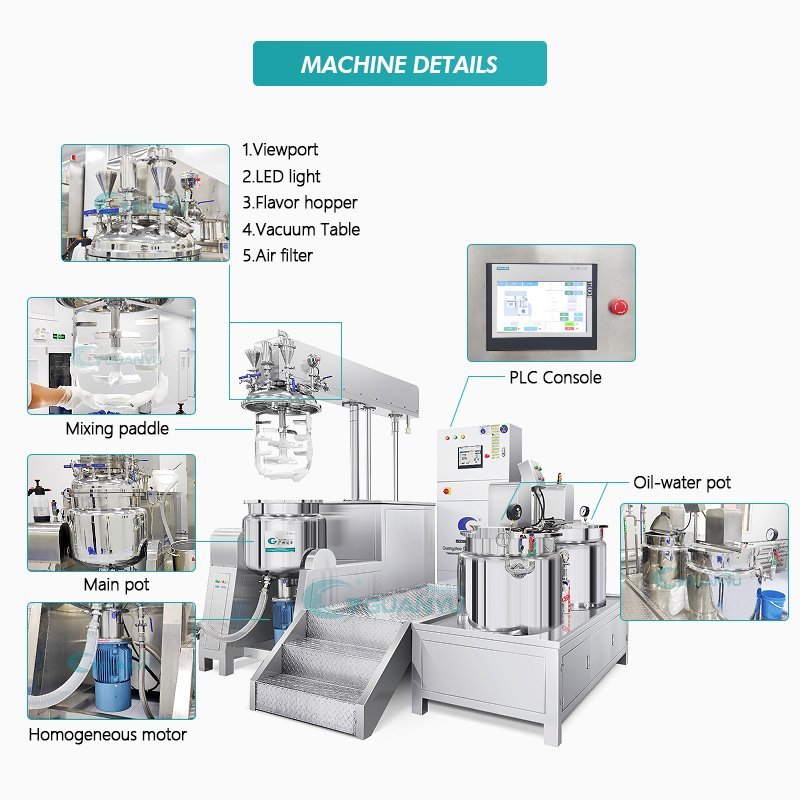
Definition
You use a vacuum emulsifying mixer to create smooth blends of liquids and solids. This machine stands out because it works under vacuum conditions. The vacuum removes air bubbles, which helps you get a stable and uniform product. You often see vacuum emulsifiers in industries like cosmetics, pharmaceuticals, food, and chemicals. These mixers handle thick materials and produce products with a consistent texture, color, and viscosity.
Tip: When you use a vacuum emulsifier homogenizer, you can adjust the mixing speed and control the temperature. This gives you more control over the final product.
Here is a table showing the main features that set a vacuum emulsifying mixer apart from other mixing equipment:
Feature | Description |
|---|---|
Vacuum Operation | The process occurs in a vacuum, eliminating bubbles in the materials. |
Customizable Mixing Speed | You can adjust the speed for different technical procedures. |
Controlled Environment | Digital controls for time and temperature ensure precise operation. |
Dual-Walled Hopper | The hopper has two walls for heating and cooling, enhancing process control. |
Material Quality | Contact parts use 316L stainless steel for durability and hygiene. |
Unique Product Characteristics | Produces goods with distinct appearance, form, particle size, and viscosity. |
Enhanced Mixing Efficiency | Vacuum features improve mixing efficiency and product handling. |
Void-Free Final Products | The regulated environment helps you make products without voids. |
Core Components
A vacuum emulsifier includes several important parts. Each part plays a key role in the emulsifying process. You can see how these components work together in the table below:
Component | Function |
|---|---|
Main Mixing Tank | Holds the mixture and withstands high pressures and temperatures. |
Homogenizer | Breaks down droplets to create a uniform emulsion. |
Stirrer | Agitates the mixture for thorough mixing. |
Heating and Cooling System | Controls the temperature for optimal emulsifying. |
Vacuum System | Removes air bubbles to improve product quality. |
Water Pot and Oil Pot | Stores and pre-heats raw materials for controlled addition. |
Hydraulic Lifting System | Lifts and tilts the tank for easy cleaning and maintenance. |
Control Panel | Lets you control mixer functions and monitor parameters. |
You benefit from the design of a vacuum emulsifier because it prevents air bubble formation. This is important for making stable emulsions. The mixer can handle different viscosities, so you can use it for many types of products. The vacuum system and homogenizer work together to give you high-quality results.
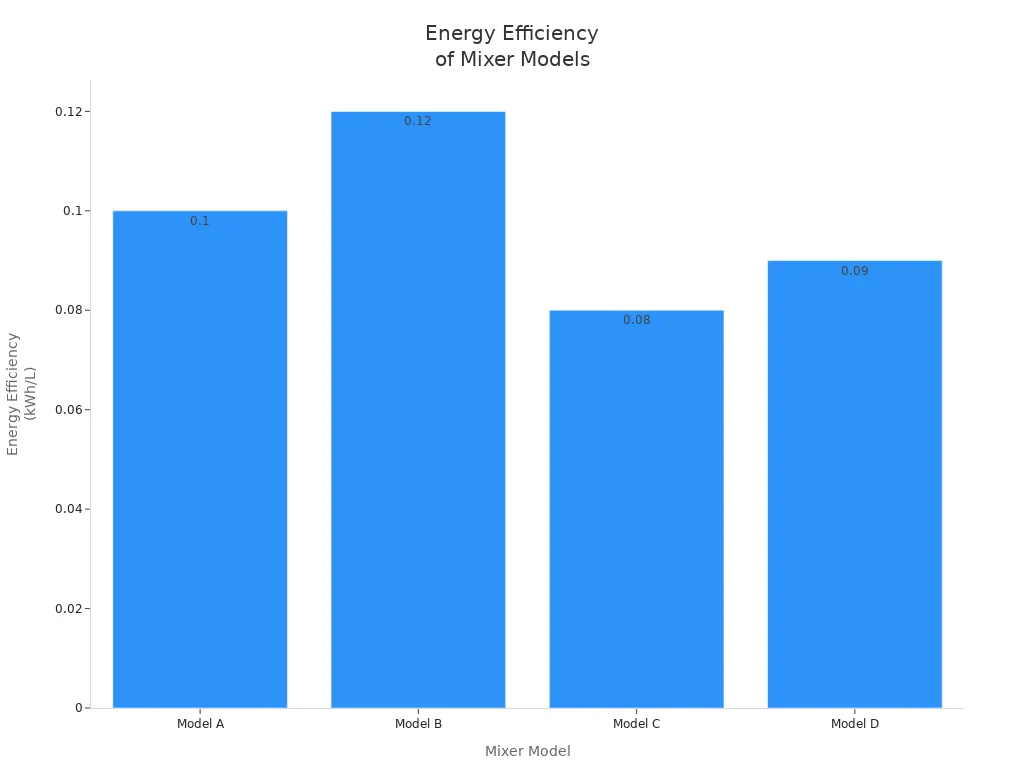
Vacuum emulsifying mixers operate efficiently under vacuum conditions. You use less energy compared to other mixers that do not have vacuum features. This helps you save on power costs while producing better products.
How a Vacuum Emulsifier Homogenizer Works
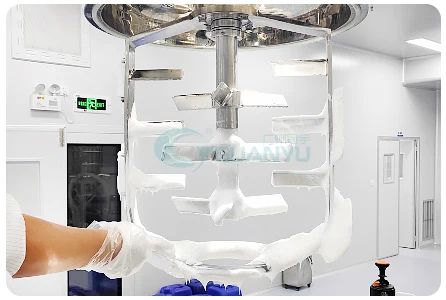
Emulsification Process
You start the process by feeding raw materials into the mixing chamber of the vacuum emulsifier. You separate these materials into oil and water phases. The vacuum system creates a low-pressure environment inside the chamber. This step removes air and helps prevent oxidation. Next, you activate the homogenizer. The rotor and stator generate strong shear forces. These forces break down particles and help you achieve a fine dispersion.
You use the heating and cooling system to control the temperature. This step ensures proper dissolution and stabilization of the emulsion. The central agitator and wall scraper work together. They mix the materials thoroughly and prevent sticking on the chamber walls. When the process finishes, you discharge the product for further processing.
Here is a step-by-step overview of the emulsification process in a vacuum emulsifying mixer:
Material Feeding: You add oil and water phases into the mixing chamber.
Vacuum Creation: You apply vacuum to remove air and prevent oxidation.
High-Shear Homogenization: The rotor-stator homogenizer breaks down particles.
Heating & Cooling Integration: You control temperature for proper dissolution.
Dual Mixing Action: The agitator and wall scraper mix materials evenly.
Discharge and Extraction: You remove the finished product for the next step.
Note: You can adjust the speed and temperature during the process to match your product requirements.
Vacuum Function
You rely on the vacuum system to improve product quality. The vacuum pump creates a low-pressure environment inside the emulsifying mixer. This action draws out air bubbles from the mixture. You get a smoother and more homogeneous product without air pockets. The vacuum function also prevents oxidation and foaming, which can affect the stability and appearance of your final product.
The table below shows how air removal improves product quality in a vacuum emulsifier:
Benefit of Air Removal | Explanation |
|---|---|
Prevents Oxidation | No air means less chance for ingredients to react and spoil. |
Reduces Foaming | Less air leads to fewer bubbles and a smoother texture. |
Enhances Mixing Efficiency | No air pockets allow for better mixing and homogenization. |
Improves Product Stability | Fewer bubbles mean a more stable and longer-lasting emulsion. |
Critical for Cosmetics | Smooth creams and lotions need air-free mixing for best results. |
Tip: You can use the vacuum emulsifier to create creams, lotions, and gels with a smooth texture and no visible bubbles.
Temperature Control
You manage temperature carefully during the emulsifying process. Lower temperatures increase viscosity. This makes it harder to disperse droplets and can lead to a coarse emulsion. Higher temperatures decrease viscosity, which helps you disperse droplets more easily. However, too much heat can cause droplets to merge, reducing emulsion stability.
You need to find the optimal temperature for your ingredients. The melting points of substances in both phases affect the best temperature. You should keep the temperatures of both phases similar, especially when working with high melting point components. This prevents crystallization and ensures a uniform product. Most emulsifying processes work best between 75℃ and 85℃, but you may need to adjust based on viscosity and the phase transition temperatures of your emulsifiers.
Lower temperatures increase viscosity and make fine dispersion difficult.
Higher temperatures decrease viscosity but may cause droplet coalescence.
Melting points of ingredients affect the best temperature.
Keeping both phases at similar temperatures prevents crystallization.
Recommended temperature range: 75℃ to 85℃, with adjustments as needed.
Tip: You can use the control panel on your vacuum emulsifier to set and monitor temperature for precise quality control.
Benefits of Vacuum Emulsifier
Homogeneous Blends
You want your products to look and feel the same every time. A vacuum emulsifier helps you achieve this goal. The machine uses high shear mixing and a powerful homogenizer to blend your ingredients evenly. This process gives you high-quality emulsions with a smooth texture and stable composition. You can count on the vacuum emulsifying mixer to deliver excellent homogenization effect and consistent results.
Vacuum homogenizer mixers provide uniform mixing of materials, resulting in higher quality outcomes.
The consistency of texture and composition is maintained throughout production, leading to stable emulsions.
These mixers operate with greater speed and efficiency, ensuring a safer mixing environment.
Tip: You can use the vacuum emulsifier homogenizer to improve your quality control and make sure every batch meets your standards.
Handling Viscous Materials
You often need to process high-viscosity products like creams, gels, and ointments. The vacuum emulsifier is designed for efficient mixing of these materials. The emulsifying performance remains strong, even with thick or sticky substances. However, you should know the limitations. The machine may not work well with highly viscous or abrasive materials, and it is not ideal for very large batches.
Type of Material | Limitations |
|---|---|
Creams | |
Gels | Challenges with abrasive materials |
Ointments | Not recommended for large batch processing |
Other fluid products |
You can use the emulsifying mixer for dispersing materials in the food industry, emulsifying cosmetics and pharmaceuticals, and homogenizing inks and textile auxiliaries.
Enhanced Product Quality
You want your products to last longer and look better. The vacuum emulsifier improves product quality by removing air bubbles and preventing oxidation during the process. This leads to stable, high-quality emulsions with a longer shelf life. Many companies have seen real results:
A cosmetic company improved their lotion’s texture and stability by switching to a vacuum emulsifying mixer, resulting in smaller and more uniform droplets and a 30% reduction in production time.
A food processing company enhanced their mayonnaise’s consistency and shelf-life by using a vacuum mixer, which prevented oxidation and air bubble formation.
A small-scale cosmetic manufacturer eliminated air bubbles in their moisturizer by using a vacuum mixer, resulting in a smoother texture and longer shelf-life, which boosted sales.
A large-scale cosmetic company improved production efficiency by 20% and reduced costs by using a vacuum mixer, which streamlined their mixing process.
You also benefit from better stability, less waste, and improved sanitation. The vacuum emulsifier uses non-stick materials and efficient cleaning systems, making it easy to maintain high hygiene standards.
Advantage | Description |
|---|---|
Stability | Vacuum emulsifying mixers enhance emulsion quality and stability by removing air bubbles, which prevents oxidation and smoothens the product. |
Waste Reduction | The mixers feature efficient cleaning mechanisms that minimize waste during operation. |
Sanitation | High sanitation standards are maintained due to the use of non-stick materials that are easy to clean and resistant to chemicals. |
Note: The vacuum emulsifier process minimizes air entrapment, so you get stable and uniform emulsions every time.
Applications of Vacuum Emulsifying Mixer
Cosmetics
You see vacuum mixers used in many cosmetic factories. These machines help you make products with smooth texture and stable quality. You can create creams, lotions, gels, ointments, and serums. The mixer helps you blend ingredients for body cream, facial masks, and makeup bases. You also use it for emulsions, suspensions, and pastes. The process removes air bubbles, so your creams and gels look better and last longer.
Ointment products
Creams
Lotions
Gels
Serums
Body cream
Facial masks
Makeup bases
Emulsions
Suspensions
Pastes
Tip: You can use the mixer to make sunscreen and other products that need a fine, stable blend.
Pharmaceuticals
You use vacuum mixers in pharmaceutical labs and factories. These machines help you make prescription creams and drug delivery gels. The mixer uses high-shear mixing and vacuum technology. You get a homogeneous and stable product every time. Uniformity is important for drug safety and effectiveness. The mixer removes bubbles and makes sure each batch is the same. You can produce high-viscosity gels, creams, mascaras, and foundations.
Vacuum mixers use a high-speed agitator in a vacuum chamber. This creates strong shear and eddy currents. You get rapid mixing and better emulsification. The process helps you avoid poor efficacy and side effects from uneven mixtures.
Food
You use vacuum mixers to make sauces, dressings, and other food products. The mixer creates stable emulsions, which help you get the right consistency. You can process high-viscosity foods like mayonnaise and pastes. The vacuum removes air bubbles, so your mixtures are smoother and taste better. You also improve shelf life and product quality.
Sauces
Dressings
Mayonnaise
Creams
Pastes
Liquid creams
Note: You can use the mixer for both small and large batches in food processing.
Chemicals
You use vacuum mixers in chemical plants for many products. The mixer helps you blend creams, ointments, emulsions, and other viscous materials. You get efficient mixing and homogenization under vacuum conditions. This prevents air bubble formation and improves product stability. You can use the mixer for solutions, gels, suspensions, and emulsions in industries like biology, pharmacy, ink, textile auxiliaries, and daily chemicals.
Industry | Products Produced |
|---|---|
Cosmetic | |
Pharmaceutical | Chemical products in small quantities |
Food | Creams, pastes |
Daily Chemicals | Emulsified products |
Biomedicine | Pharmaceutical formulations |
Tip: You can use the mixer for high-viscosity chemical products that need precise blending.
You now understand how these mixers help you create stable, high-quality products across many industries. The table below highlights key features and benefits:
Main Feature | Benefit |
|---|---|
Removes air, prevents product failure | |
Ensures steady quality and performance | |
Self-Cleaning System | Saves time and resources |
High-Speed Mixing | Produces smooth, stable mixtures |
Time Efficiency | Speeds up production |
You can rely on this technology for better quality, less waste, and improved efficiency.
FAQ
What is the main advantage of using a vacuum emulsifying mixer?
You get a smooth, bubble-free product. The vacuum removes air, so your creams, lotions, or sauces look better and last longer. This process also helps you achieve a stable blend every time.
Can you use a vacuum emulsifying mixer for small batches?
Yes, you can. Many mixers come in different sizes. You can choose a model that fits your production needs, whether you make small test batches or large-scale products.
How do you clean a vacuum emulsifying mixer?
You use the built-in cleaning system. Most mixers have self-cleaning features. You run water and cleaning agents through the machine. This process saves you time and keeps your equipment sanitary.
What types of products can you make with this mixer?
You can make creams, gels, ointments, sauces, dressings, and chemical emulsions. The mixer works well for cosmetics, food, pharmaceuticals, and chemicals.
Does a vacuum emulsifying mixer require special training to operate?
You do not need advanced training. Most mixers have user-friendly control panels. You should read the manual and follow safety guidelines. Some companies offer training for new users.
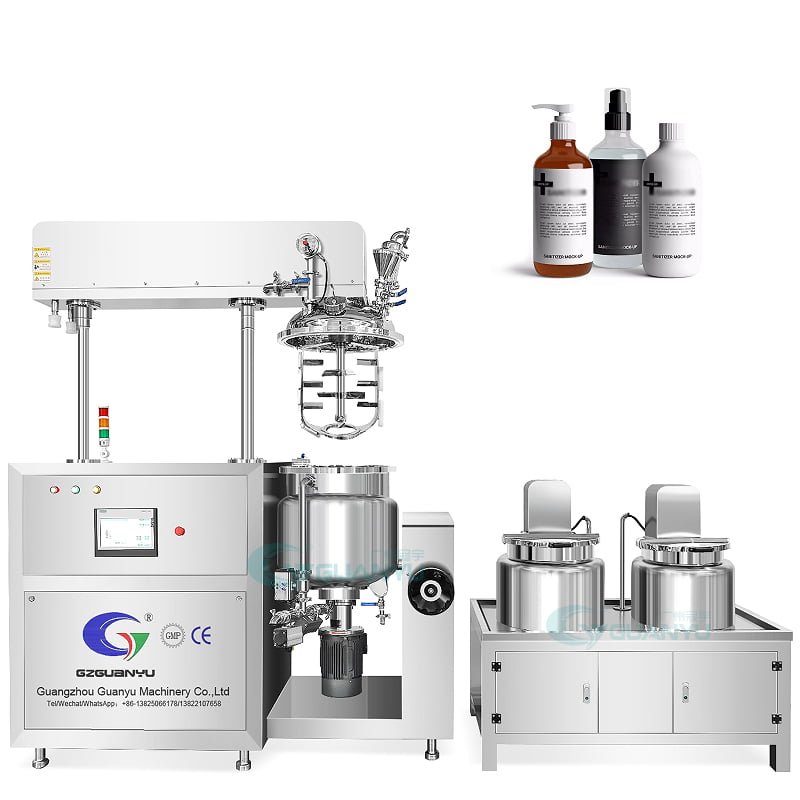
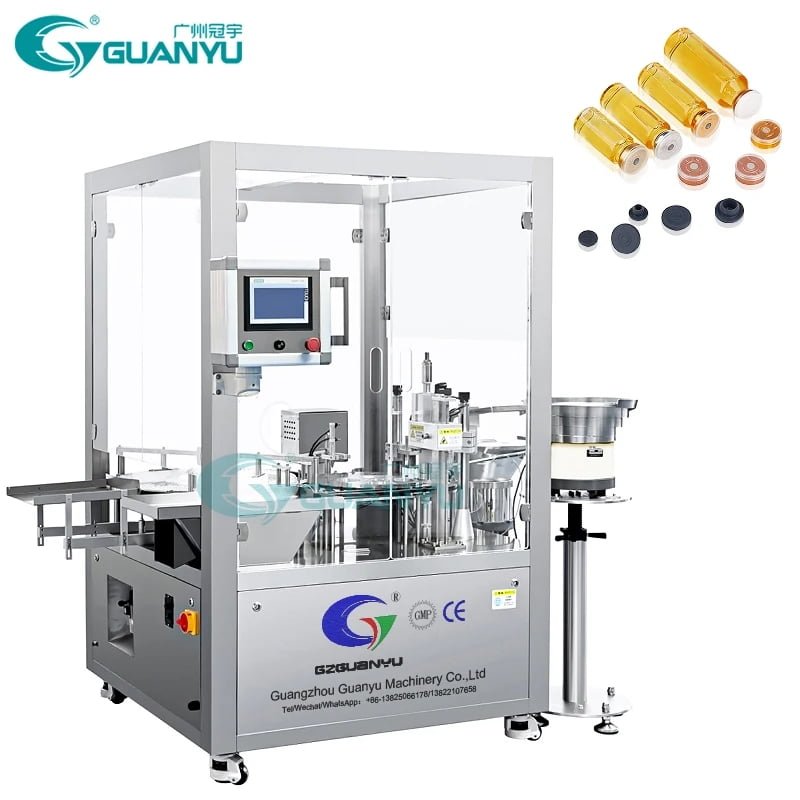
**glpro**
glpro is a natural dietary supplement designed to promote balanced blood sugar levels and curb sugar cravings.
**breathe**
breathe is a plant-powered tincture crafted to promote lung performance and enhance your breathing quality.
1777sxgame.net, huh? Number heavy name! Worth a shot if they have the games I’m looking for. Let’s see what’s up. 1777sxgame
Heard 777zs is pretty cool. Let us go and play the game online and get excited now:777zs